So what do you get when you mix an artist, a fisherwoman, and an ex-correctional officer?
That, my friends, would be the talented fish printer extraordinaire Corinne Danzl!
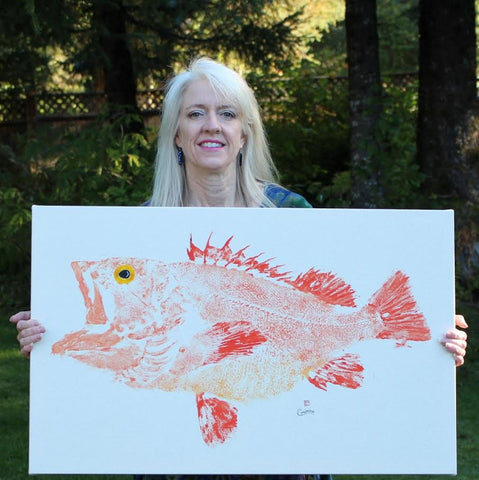
Corinne and her husband Keith live in the beautiful town of Seward in south central Alaska. Seward is nestled between Resurrection Bay and the Kenai mountains. It is the southern terminus of the Alaska Railroad and the northern terminus for cruise ships that come up from Seattle and Vancouver during the summer months.
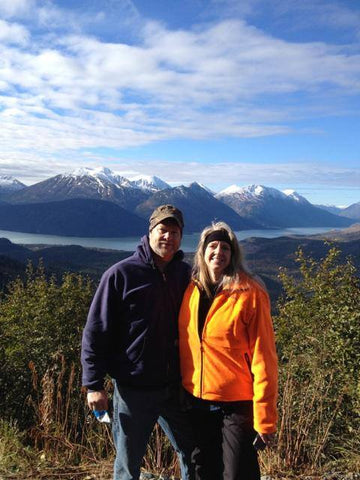
From where we sit here in Ketchikan, Seward is about 730 miles away as the crow flies. That is, if the crow is alright with flying over open ocean for 700+ miles. The crow could also get into a car in Ketchikan, drive onto the Alaska Marine Highway ferry to British Columbia, Canada, and drive for about 42 hours to Seward. For reference:
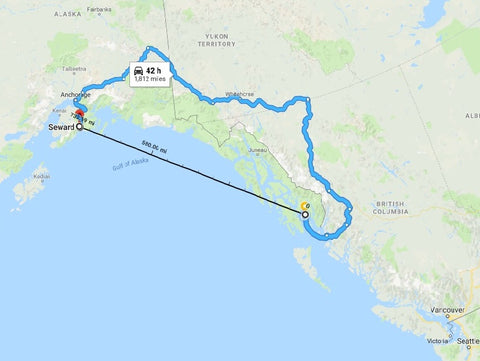
However in order to ask Corinne some questions for the blog post, the crow writing this has settled for email correspondence.
But enough about crows!
And on to more about Corinne and her artwork!
Corinne’s medium of choice is “Gyotaku." If you’ve never heard of it, not to worry! First of all, it’s a Japanese word so there’s a decent chance it’s not a part of your daily vocabulary. Secondly, it’s a relatively “new” technique. Developed in the mid-1800s, gyotaku was not originally intended to act as art. Only more recently has it become the art form that we know today. The word "gyotaku" comes from the Japanese words "gyo" (fish) and "taku" (rubbing).

Gyotaku began as a way for Japanese fishermen to keep a record of the fish they caught. They would apply ink to one side of a freshly caught fish, then cover the fish with rice paper and rub to create an exact image of the fish. The ink was non-toxic and water soluble and still allowed for the fish to be processed for eating, while preserving records of fish species and sizes.
These prints were incredibly life like and when done properly they retained the subtle patterns and textures of the fish. The prints were so accurate that they were sometimes used to determine the winners of fishing contests in Japan.
Side note: how cool would it be if people had to do that for the salmon derby here in Ketchikan? No? Ok nevermind. Best to leave it to the pros like Corinne, I suppose!
Today the purpose of Gyotaku has evolved from a practical means of recording a catch to a decorative art form.
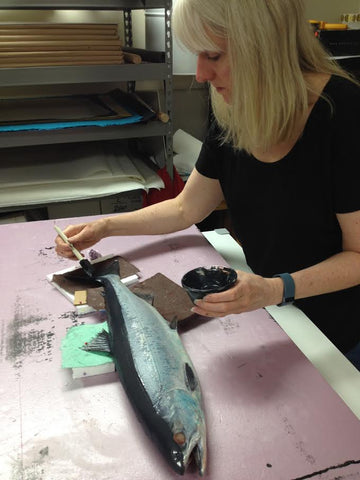
When I asked Corinne how she first started doing fish prints, I was surprised by her reluctant beginnings as a full time artist. After retiring from her career as a Correctional Officer in 2013, she spent the following year doing all the things she really enjoyed- hiking, reading books, fishing, drinking tea. A year later she decided to start looking for another job. Around the same time, a friend and former co-worker reached out to her about taking over her gyotaku art printing business.
Though she was always drawing as a child and was often told she should become an artist, Corinne says she “had no intention of ever becoming an artist.” The idea of being a "starving artist" didn't appeal to her so knew her answer would be an "emphatic no." To avoid hurting her friend's feelings, she stalled for time and suggested getting together to talk about it. "I figured I could let her down gently in person, " says Corinne.
Corinne and Keith listened over dinner as her friend explained the gyotaku process. She knew Corinne would love it and be a perfect fit to take over the business. Though Corinne still wasn't fully sold, with the support of Keith, she very reluctantly agreed to go for it.
When she officially took over in 2015, she realized how much she had missed the creative process. "Even though I’d never really been into painting, I took to Gyotaku like a fish to water (pun intended),” says Corinne.
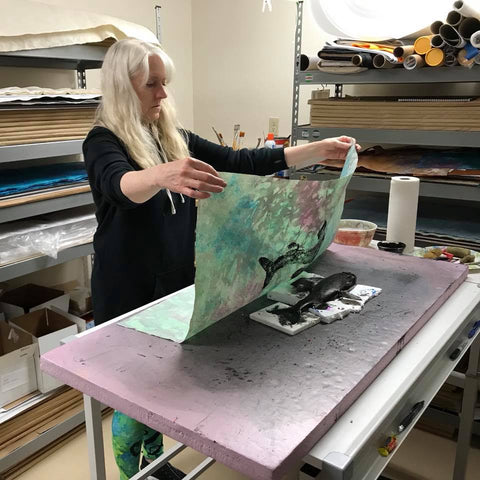
Since taking over the business, Corrine has refined her technique and expanded the traditional art form into nontraditional realms such as her use of handmade papers from Thailand and Nepal. Traditionally, gyotaku used white rice paper, but Corinne says, "My natural attraction to brilliant colors quickly led me to look for alternatives to rice paper...My favorite papers are brightly colored, hand patterned." Take these original octopus prints, for example. The overall effect is almost psychedelic even- a welcomed departure from the utilitarian origins of gyotaku printing.
As you may have guessed, Corinne's favorite creatures to print are octopus. "I love printing octopodes because I can place their tentacles in a myriad of fun and creative positions. Whereas I’m fairly limited when positioning a fish."
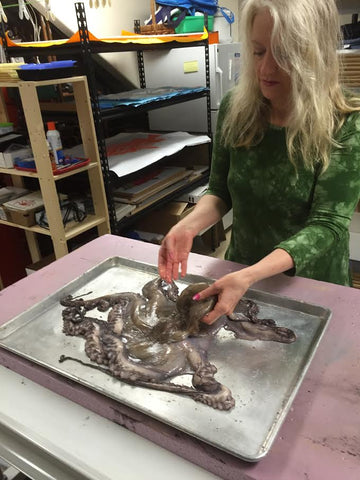
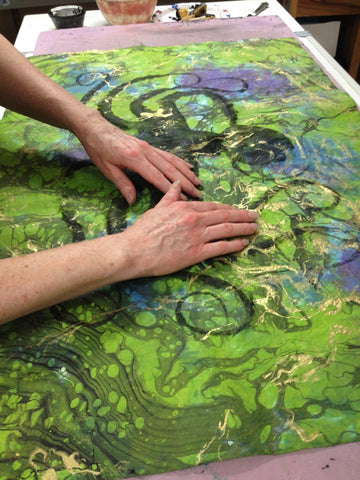
So octopus are fun, but what is the most challenging to print with? Corinne answers again- octopus. "As fun as the tentacles of an octopus are, to work with, they tend to stick to my paper." She then describes an elaborate dance of teamwork with her husband Keith to lift the paper from the sticky tentacles and reveal the final print.
Eyes and other details are often added in by hand after the initial print is made. In this photo Corinne details a salmon on handmade paper.
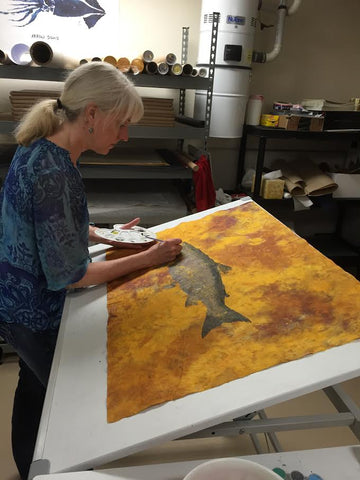
As for where the fish come from- “The majority of the fish I use have been caught by either Keith or myself. However, I have occasionally done fish rubs of fish that other people have given me.” Staying true to the tradition of gyotaku and being sure not to let the fish go to waste, Corinne uses non-toxic paints and inks so she can wash the fish off, cook it, and eat it.
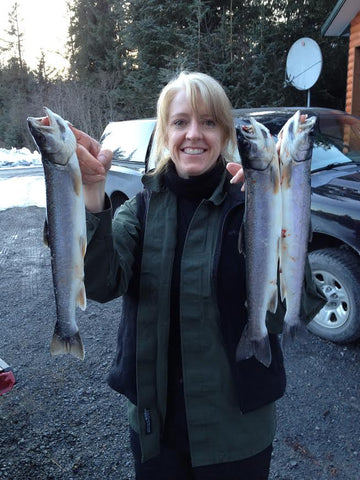
When she's not creating artwork, Corinne enjoys hiking, berry picking, hunting, and fishing. Although she was initially hesitant to become a full time artist, Corinne feels secure in her decision. "Creating art, and managing the business end of things, takes up a lot of my time, but I absolutely love what I’m doing. My husband Keith, who is retired, helps out a lot with the business side of things. I feel incredibly blessed to have such a loving and supportive husband. I truly wouldn’t be able to do this if not for his support."
From her funky, multicolored octopus arrangements to her more traditional style fish prints on a clean white background and from economical poster print options to stunning original prints, Corinne's work offers something for everyone to love. We love representing her work here in Ketchikan and you can check it out here on our website or in store- Corinne Danzl at Scanlon Gallery
Corinne also maintains a website with more impressive examples of her work and links to a slew of amazing products on her Zazzle page.
You can find her website here: https://inkgoeswild.com/
You can also keep up with her fishy business (get it? Fishy!) and watch some cool demo videos on her Facebook page here: www.facebook.com/inkgoeswildalaska/
Before you know it you'll be sporting her sweet octopus leggings on the daily, you'll have her stickers stuck on every surface you can find, and fish prints hanging all over your walls. And you have our full support!
Thanks for reading!
Artfully yours,
Maria at Scanlon's

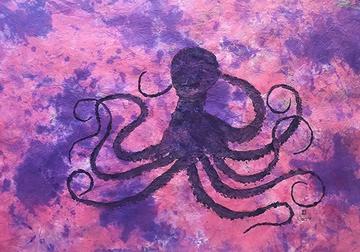
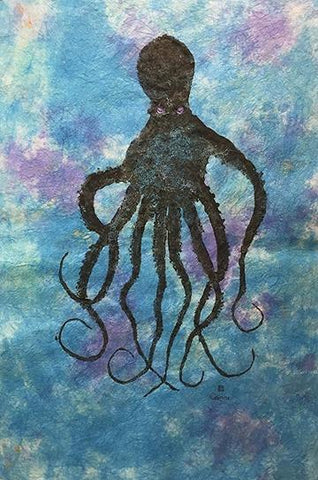
Very well written. She is such an interesting person too. I look forward to having coffee with her one day. I have a couple of her stickers and hope to snag some leggings soon. :-)
Great post! I love the photos of the process too. They really paint the picture (see what I did there?). Beautiful and sustainable work with Alaskan wildlife!